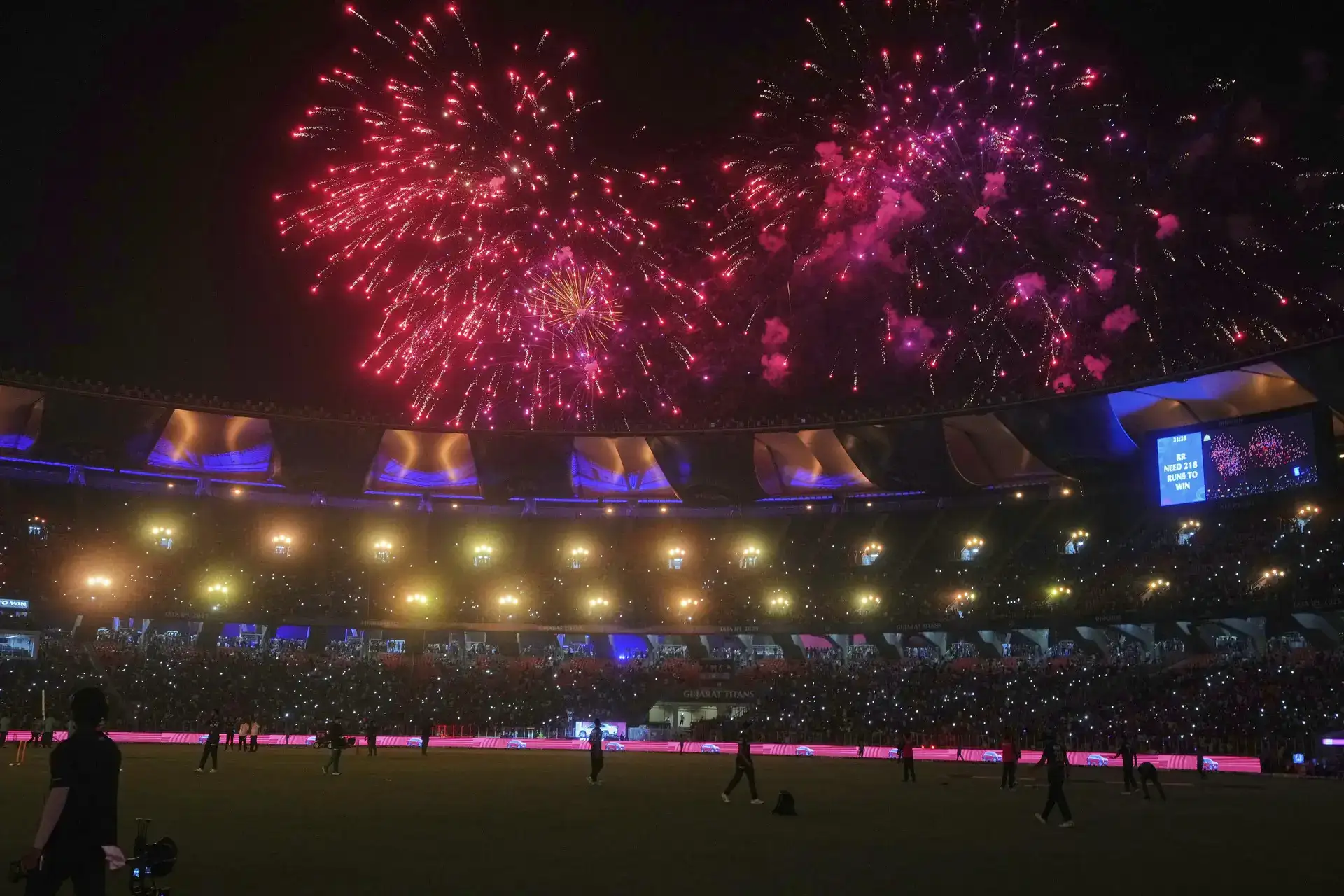A vendéglátóipar átalakítása
Sportturizmus forradalmi változást hozott az indiai vendéglátóiparban, az Indiai Premier League (IPL) utat engedve a turizmus fellendülésének. Ez az egyedülálló utazási forma növeli a keresletet különböző szegmensekben, beleértve a vonat- és repülőjegy-foglalásokat, a szállodai elhelyezést és a helyi étkezési lehetőségeket. Az IPL-mérkőzéseknek otthont adó városokban figyelemre méltó látogatói beáramlás tapasztalható, amely serkenti a helyi gazdaságokat és újjáéleszti a szolgáltatóipart.
Innovative Hospitality Experiences
Az IPL befolyása messze túlmutat a zsúfolt stadionokon; átformálta a szállodák és a magánszállások működését. A mérkőzés helyszíneihez közeli számos ingatlan elkezdte átgondolni kínálatát, olyan élményeket teremtve, amelyek egy fiatalabb, dinamikusabb közönségnek szólnak. Ahelyett, hogy egyszerűen csak egy pihenőhelyet biztosítanának, a szállodák átalakulnak szurkolói zónák. Ez különösen igaz az olyan városokban, mint Ahmedabad, Bengaluru és Hyderabad, ahol a négy- és ötcsillagos szállodák magával ragadó meccsnapi élményeket vezettek be.
Például a trend eltolódik a pusztán elhelyezkedési előnyöktől az élményalapú ajánlatok felé. Ahogy Harshvardhan Amle, az UpSwing Cognitive Hospitality Solutions társalapítója és vezérigazgatója megjegyzi: „Már nem a közelségről van szó, hanem az élményről.” Sok szálloda alkalmazott AI technológiák krikett témájú csomagokat hozzanak létre, és dinamikus ajánlatokat nyújtsanak. Az eredmény? A mérkőzésnapokon a foglaltsági arány elképesztő 95-100%-ot ér el, szemben a nem mérkőzésnapokon tapasztalható alacsonyabb számokkal.
A 2. és 3. szintű városok növekedése
Az IPL kulcsfontosságúvá vált a gyakran figyelmen kívül hagyott városok fejlődésében. Az olyan helyeken megrendezett mérkőzésekkel, mint Jaipur, Chandigarh és Guwahati, ezek a városok a vendéglátás új határvidékévé válnak. Ahogy az IPL országos médiafigyelmet kap, az infrastrukturális beruházások megugrottak, ami gazdasági tevékenységeket indított el a vendéglátás és a közlekedés területén.
Például az IPL szezon alatt a második vonalbeli városokban figyelemre méltóan megnőtt a rövid távú foglalások száma, ami a helyi vendégházak és panziók iránti megnövekedett keresletben tükröződött. Az olyan városokban, mint Guwahati, a krikett stadionok közelében található Airbnb-stílusú szálláshelyek a mérkőzések időpontjának bejelentését követő napokon belül teljesen lefoglaltak voltak.
Ez a fellendülés nem korlátozódik a bejáratott márkákra. A kisvállalkozók is virágoznak, kihasználva a látogatók beáramlását. Az utcai árusok és a helyi élmények, például a folyók mentén meccsnéző bulikat kínáló hajókirándulások innovatív módszereket keresnek a látogatók bevonására. Ahogy Amle kiemeli: "A technológiában jártas szállodatulajdonosok vendégadatokat gyűjtenek, hogy személyre szabott promóciókat kínáljanak, az IPL-rajongókat hűséges vásárlókká alakítva."
Az IPL által vezérelt utazási trendek
Az IPL népszerűsége nemcsak a vendéglátóipart gazdagítja, hanem forradalmasítja az utazási szokásokat is. A vasúti rendszer például hihetetlen növekedést tapasztal ebben a szezonban. A történelmi adatok elképesztő növekedést mutatnak a vonatticketek foglalásában az olyan városok esetében, mint Hyderabad, ahol a foglalások évről évre 183%-tal nőttek. Ez a vonatutazási preferencia megfizethető lehetőségeket kínál a szurkolóknak, miközben növeli a helyi hotelek és éttermek járulékos bevételét.
Ráadásul a márkák felismerik az IPL körüli marketingpotenciált. Számos vezető vállalat hangolja össze stratégiáit az IPL-csapatokkal, hogy rajongók millióival lépjen kapcsolatba, megerősítve azt az elképzelést, hogy a krikett India utazási szövevényének létfontosságú részét képezi.
A fiatalok megcélzása
Az IPL jelentős hatással van a fiatal demográfiára, különösen a millenniumi generációra és a Z generációra, akik az IPL nézők jelentős részét teszik ki. Ezek a fiatalabb nézők a puszta krikettmérkőzéseken túlmutató élményeket keresnek; egy holisztikus utazásra vágynak, amely magában foglalja az éjszakai életet, a helyi konyhát és a kulturális felfedezést. Legyen szó Instagram-szelfikről a stadionokban vagy étkezési élmények megosztásáról, olyan történeteket hoznak létre, amelyek tükrözik az utazásaikat.
Az olyan intézmények, mint a Zostel, egy hátizsákos turisták számára fenntartott hostelek hálózata, és a Zo Trips, egy válogatott utazási élmény platform, kihasználták ezt a tendenciát azáltal, hogy innovatív szállásokat és a fiatal utazókra szabott élményeket kínálnak. Az elemzők azt jósolják, hogy az IPL hozzájárulása India GDP-jéhez tovább növekedhet, a rendelkezésre álló jövedelmek növekedése és a részt vevő városok bővülő száma miatt.
Jövőbeli szempontok és fenntarthatóság
Az IPL-rajongók elszállásolására irányuló fegyverkezési verseny ellenére kihívások leselkednek. A hulladékgazdálkodással és a szén-dioxid-kibocsátással kapcsolatos kérdések arra ösztönzik az iparági szereplőket, hogy zöldebb gyakorlatokat alkalmazzanak. Ebben a szezonban olyan kezdeményezések voltak, mint a napenergiával működő stadionlounge-ok és az újrafelhasználható étkészletek, amelyek célja a műanyaghulladék csökkentése. Amle hangsúlyozza a fenntarthatóság szükségességét: „Már nem elég csak egy szobát kínálni; a fenntarthatóságnak alapvető pillérnek kell lennie.”
Záró megjegyzések
Az IPL példázza, hogy egy sportesemény hogyan lépheti túl a krikettpályát, és hogyan gyakorolhat széleskörű hatást India utazási ökoszisztémájára. A krikett iránti lelkesedés és a turizmus konvergenciája nemcsak a vendéglátást ösztönzi, hanem a helyi üzleteket, éttermeket is bevonja, és taxi services. Ahogy a szezon kibontakozik, bebizonyítja, hogy a krikett nem csupán egy játék; kulcsszerepet játszik India turisztikai arculatának fellendítésében.
Ennek a dinamikának a középpontjában a GetTransfer.com áll, amely zökkenőmentesen illeszkedik ebbe a fejlődő turisztikai narratívába azáltal, hogy felhasználóbarát platformot kínál a testre szabható transzferek foglalásához. Akár egy mérkőzésre utazik, akár a helyi látnivalókat fedezi fel, a GetTransfer biztosítja, hogy az utazók átlátható árakat, átfogó járműválasztékot élvezhessenek, és rugalmasan választhassák ki a járműveiket. Az elkötelezettség a megfizethetőség és a széles választék iránt élvezetessé teszi az IPL-mérkőzésekre való utazás tervezését.
Felismerve, hogy még a legjobb értékelések sem helyettesíthetik a személyes tapasztalatot, a GetTransfer.com tökéletes megoldást kínál arra, hogy autót béreljen sofőrrel ellenőrzött szolgáltatóktól versenyképes áron, segítve az utazókat a felesleges költségek és csalódások elkerülésében. A járművek széles választékával és a személyre szabott opciókkal a fuvarfoglalás még soha nem volt ilyen egyszerű. GetTransfer.com

 Az IPL által kiváltott turizmus növekvő hulláma Indiában">
Az IPL által kiváltott turizmus növekvő hulláma Indiában">
Megjegyzések